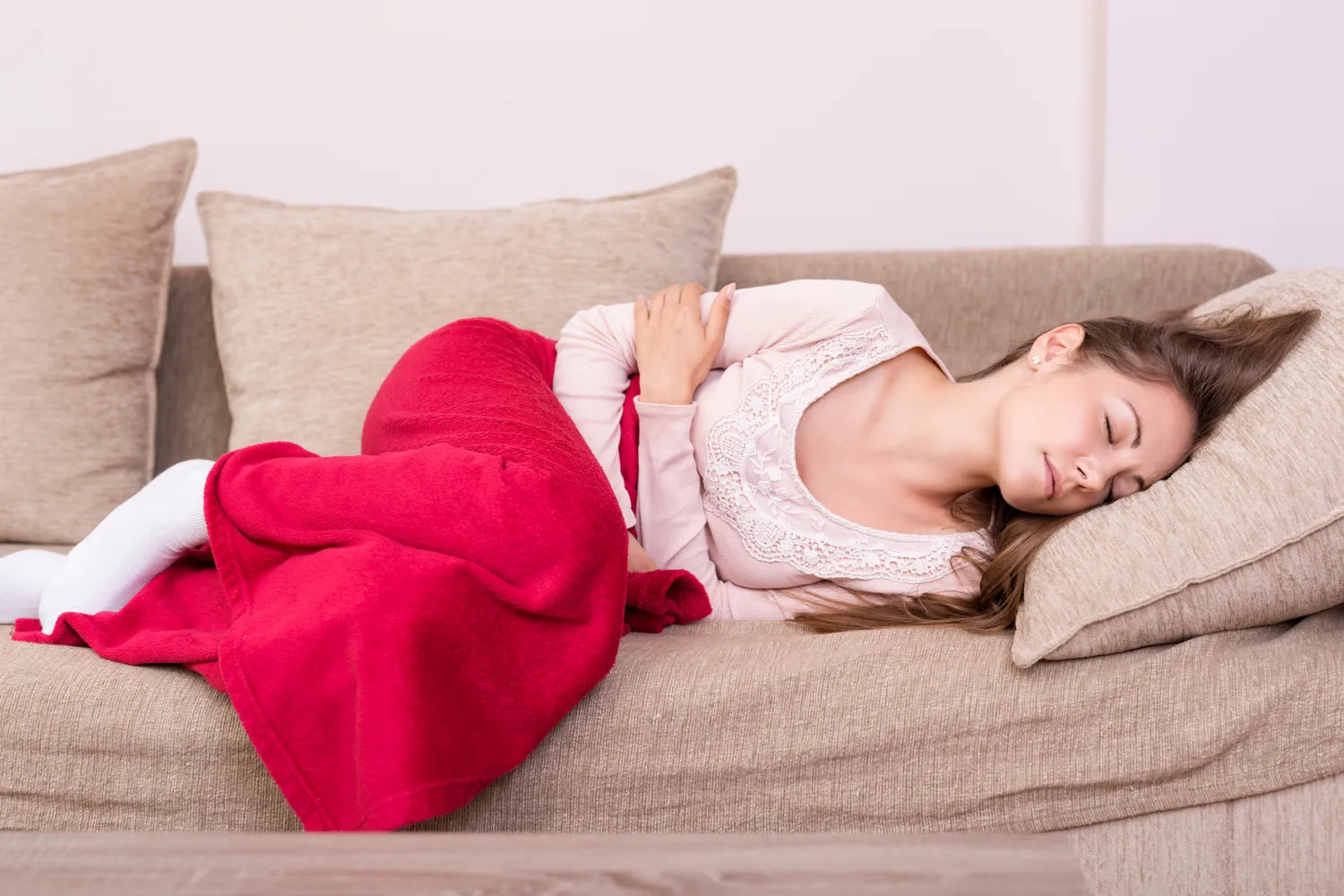Nobody ever said period symptoms are pleasant, but they are normal. Most people who menstruate experience common PMS side effects like clockwork each month. And yet, sometimes your period goes haywire for no understandable reason.
Having period-like symptoms but no period isn’t outside the range of common occurrences, but it could be indicative of something outside of your period. Let’s explore a few possible causes and explanations for what you’re going through.
What Causes Period Symptoms Before or After Your Period?
In order to pinpoint abnormal period symptoms when not on your period, we need to review the phases of the menstrual cycle. Each stage has its own characteristics that determine how you may feel and what you may experience.
So, here is a recap of Menstruation 101.
What Are the Phases of the Menstrual Cycle?
Menstrual Phase
Days one through five (more or less) are the menstrual phase when you have your period. During this time, period symptoms are expected, as well as bleeding and the need for period products like pads and tampons.
Follicular Phase
The menstrual phase is also part of the follicular phase, which lasts about six or so more days until ovulation (roughly two weeks). The uterus lining becomes thicker, and eggs are prepared in the ovaries. This is the most fertile stage and estrogen peaks. Energy levels tend to peak, as well.
Ovulation
Then, an egg is released during the ovulation window, which lasts roughly three to four days. In the days after ovulation, progesterone levels rise. You may feel breast soreness or experience spotting.
Luteal Phase
The luteal phase stretches the last 12 or so days until the next period. Your hormones drop in preparation for shedding your uterine lining. These pre-menstruation days are when PMS symptoms are typically expected.
What Are the Common Period Symptoms?
Although periods occur each month for most people with vaginas, they can still feel really unpredictable and confusing! Sometimes, they simply don’t do what you expect. Hormones sometimes feel like the world’s greatest mystery (especially when it comes to what they’re doing in your body), but there’s a lot we do know.
There are the most common symptoms (called premenstrual or PMS symptoms) that people tend to experience before or during their period. You may have some or all, which also may vary from month to month.
- Abdominal pain (cramps)
- Vaginal discharge
- Bloating
- Constipation
- Mood swings
- Fatigue
- Food cravings
- Breast tenderness
- Aches and pains, including headaches
- Low sex drive
You might also experience any of these same symptoms before or after you expect to or when you don’t actually have a period. Hormones can be erratic, so sometimes, having period symptoms without a period can be nothing out of the ordinary.
Let’s explore some possible reasons for your period fluctuations.
Early Pregnancy
Of course, pregnancy can’t be ruled out when considering why you might be experiencing irregular hormonal changes. For people with vaginas, pregnancy could be a factor in your abnormal periods, as many signs of pregnancy are the same as period symptoms.
You may be exhibiting early signs of pregnancy if you have tender breasts, tiredness, nausea, cravings, weight gain, implantation bleeding (spotting mid-month), or frequent bowel movements. You’re likely safe if you’re on contraceptives, like oral birth control or an implant, but taking a pregnancy test will help clear up whether you have symptoms of pregnancy or your period.
Polycystic Ovary Syndrome
Polycystic ovarian syndrome is a hormonal issue that can impact reproductive health. People with PCOS may have very few or infrequent periods, as well as irregular cycles, as their bodies sometimes fail to release eggs — the important ovulation phase.
You might have period symptoms but no period due to PCOS. Other common indicators are acne, trouble with weight loss, ovarian cysts, and hormonal imbalances. Hormonal birth control can help manage symptoms, so talk to your doctor if you think this may be you.
Endometriosis
If you’re experiencing period symptoms outside of your period, particularly pelvic pain, you might be suffering from a condition called endometriosis. This disease of the tissue causes growth outside of the uterus as well as inside.
It can result in severe pain during menstruation but also during urination, intercourse, and the other phases of your cycle. Because the lining grows super thick, it can result in heavy periods.
What you may think is period symptoms outside of your period could actually be scar tissue causing pelvic and bladder pain. You may also be experiencing pelvic inflammatory disease.
Pelvic Inflammatory Disease (PID) is a separate condition that may be more likely to occur in those with endometriosis. PID is an inflammation of the reproductive tract, including the fallopian tubes, uterus, and ovaries. It can be caused by sexually transmitted diseases (STDs), whereas the cause of endometriosis is relatively unknown.
Both conditions can cause abdominal cramping and lower back pain. If you suspect either issue, you should make an appointment with your healthcare provider.
Menopause
If you’re nearing menopause, it may be the culprit of period symptoms without a period. Menopause typically begins between ages 45 and 55, but perimenopause can begin years earlier. Both stages of hormonal changes can result in period-like symptoms. Oftentimes, the adjustment into menopause causes irregular cycles from one month to another.
Menopause is a natural process for people with ovaries, and fluctuations for months or even years before full menopause are common. However, if you’re concerned about your symptoms, it’s always best to make an appointment to discuss your wellness.
Ongoing and Intense Stress
Life can certainly be stressful. Although a good self-care ritual and ways to unwind and de-stress at the end of each day go a long way, some stress is unavoidable. Whether something unexpected crops up or a new situation begins to take a toll, stress can hinder your health — and your period.
Studies have found a connection between stress and period symptoms, like shorter or abnormal cycles and a heavy flow. It makes sense that stress has an effect on hormones since stress is hormonal.
The primary stress hormone is cortisol, which your body releases in times of elevated panic. Too much cortisol can cause irregular periods, including missed periods and symptoms of PMS before menstruation.
When To See a Doctor About Period Symptoms
As a general rule of thumb, it’s always best to talk to your doctor or gynecologist when you’re concerned about your menstrual cycle. Make an appointment if you’re worried about having abnormal period symptoms. They’ll be able to pinpoint the issue and may recommend bloodwork to test your hormone levels.
If you have missed multiple months of your period, you should speak with your doctor. If you think your IUD or birth control pill isn’t working effectively, they can properly assess you. And if you’re worried your irregular period might be due to pregnancy, make an appointment with an OB/GYN.
Your Hormones Can Be Your Friend
Think of your hormones like an unpredictable college roommate. Although you may not love your period, most people with vaginas learn to live with them.
And sometimes, everything operates smoothly and peacefully, and life is good. But if you have any concerns, get yourself checked out. Your period probably isn’t going anywhere soon, so it’s best to make friends with the side effects.
Sources:
Endometriosis | World Health Organization
Pelvic Inflammatory Disease (PID): Symptoms & Treatment | Cleveland Clinic






